
Temples of Fire |
Playlist: Mesopotamia - B52s Yes I know it's next door! |
 |
The information the party had been supplied indicated that British Intelligence's contact in Isfahan was one Kourush Spahany, a bazari with his own family ceramic business.
Spahany’s family had had a workshop and stall in the Bazar-e Bozorg since time immemorial (according to Kourush’s grandmother, at least). Although the family’s tile making business suffered a decline in the previous century, recent restoration work around the city had allowed them to re-establish themselves amongst the more powerful of the city’s bazaris due to the demand for their services and the rarity of other craftsmen in the field. The Spahany family had a more recent history of aiding the British, starting with the Russian “acquisition” of their city under the terms of the Anglo-Russian Convention. They had used their position within the bazaar, the hub through which all of Isfahan’s citizenry passes on an almost daily basis, to keep their associates informed of the city’s comings and goings, large and small. Kourush had inherited this aspect of the family business along with his ceramics skills, and his love of photography had certainly come in handy for both.
Locating his place of business, the group made contact with the standard passphrases and Kourush shook hands all round. He arranged a small house for the agents to stay in, and the group retired for the night - apart from some scouting.
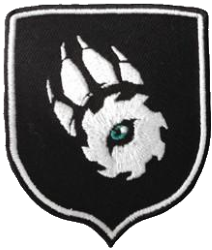 |
Joe took some binoculars and walked through the town until he could see the hill at Marabin, then scanned it for some time. There was a ruined temple complex on the lower slopes of the hill, topped with a cylindrical Tower of Sacrifice on the summit. Somewhat further down the hill was a fenced enclosure up against the hillside on one of the highest flat surfaces suitable for heavy machinery. Joe studied this carefully for some time, observing half a dozen or so men moving around inside. Several seemed dressed in the same grubby-looking overalls, and straining his eyes, Joe could see what looked like an all-too-familiar shoulder patch on at least one. He lowered the binoculars with a muttered curse, though he wasn't really surprised to discover that their paths had crossed that of Nachtwölfe once more.
 |
Jake, once settled in his room, set off out into the bazaar as it shifted into night mode and, excercising his linguistic and people skills, sauntered from ghavekhune (coffee-house) to coffee-house, chatting, making friends, and picking up rumours where he could. He'd been hoping to pick up a bottle of wine for the evening, but no-one was prepared to take to him that much on the first encounter. Over a strong, black Persian tea and a qalyan (water pipe) he did, however, pick up a very good feel for the mood of the town - and it was not good; disquiet and fear were very much at the forefront.
The gossip was centred firmly on the growing number of mutilated corpses that had been discovered along the river on the outskirts of the city. Each had, apparently, been mauled to death and their eyes had been removed; no trace of which could be found. Some of the victims’ families are demanding diyeh (blood money) in compensation for the murder of their loved ones, an old Sharia tradition that was not currently practiced in Persia.
Even if it was available, the old men noded sagely to one another, without a credible perpetrator, who would the deceased’s relatives claim the money from? The matter was made even worse by the fact that the only potential felon has been identified by terrified villagers as the Thief of Sight, a creature of legend said to stalk the deserts looking for human eyes to feast on.
Jake's subtle enquiries revealed that there had been four or five deaths in the last few weeks. Several more people were missing from the outlying villages, but they might have been just visiting relatives elsewhere; no-one seemed to be completely sure. The sightings of the creature has all, as far as Jake could tell, been made from a distance and at night; many were second, or even third, hand. Some of the witnesses were widely reported to be genuine, upstanding sorts; others were mentioned with a knowing nod or look which suggested that their testimony was regarded with a degree of suspicion by both the authorities and gossips alike.
As to the creature itself, the tales were suitably varied. Some described it as being approximately man-sized, although others insisted it was far larger. It was said to possess huge black wings that flapped menacingly as it stalked the hills near Marabin, although not everyone claimed to have seen these. Others described it as having a thick, shaggy mane, the claws of a lion, and multiple sets of eyes.
Some pointed to the fact that the creature only appeared after the French archaeologists and their German engineers started to dig again at the old ruins. The more superstitious amongst the people Jake talked to made a warding gesture to protect themselves when they mentioned it, before suggesting that perhaps the strange machines the foreigners were using had disturbed something buried deep within the ancient mountain.
For whatever reason, the beast had chosen not to attack those who had disturbed it or - if it had, they have not reported it. The locals did not seem to be entirely surprised that the creature had ignored the archaeologists and many seemed to have accepted that it was merely their fate (sarnevesht) to suffer as a result of the foreigners’ actions.
One thing that became clear was that the Zoroastrian community was particularly unhappy with what they saw as the pollution of the element of earth and, potentially, water, with each body that was dumped. They were also concerned that a former holy site of theirs may be being desecrated during the murders. As a minority, they were not sure that the authorities would take their concerns seriously above and beyond the fact that strange deaths were occurring.
Meanwhile, Birapeer and Anné, in civvies, wandered out into the Bazaar, acting the roles of tourists, apparently simply gawking and purchasing supplies but in reality watching to see if foreigners were treated as exceptional or suspicious. They were slightly flamboyant in their approach whereas Joe, following behind, kept himself out of sight while he watched for anyone observing them. Sure enough, after a while he became aware of a local man, a row of stalls over to the right of Birapeer and Anné, keeping pace with them and observing them. He was dressed much like the locals, but wore a different and distinctive kind of hat, looking as if it was made of a heavy felt.
Birapeer and Anné reached the edge of the bazaar and began to head through the streets towards the safe house. This seemed to confuse their tail, who watched them for a while and then headed into a coffee-house. Joe followed him, and observed him take coffee in a couple of places, talking to locals who conversed with him but showed a degree of caution and mistrust, almost in the same way a British pub's drinkers would treat a strange Gypsy coming in and talking to them. Eventually the man reached the edge of town, untethered a horse and rode off into the night, looking far happier on his horse than he did in the coffee-house.
When they describled this to Khourush, he said that from the look of it, the man was probably a Qashq'ai nomad, a people with a rather unsavoury reputation for producing groups of bandits that preyed on travellers out in the desert.
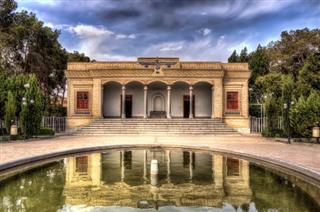 |
The next day, as they were finishing breakfast, Kourush turned up, explaining that he was going to take them to see his brother Jamshid, who was a priest at the modern Zoroastrian Fire Temple on the edge of town. Once ready they walked across town to the temple.
From the outside, the temple was a relatively unassuming building set amidst a well-tended formal garden. A tiled Faravahar (the Zoroastrian winged sun disc) in blue and gold was mounted on the stonework of the main façade above a short flight of steps which led up to a colonnaded terrace. There was a carved wooden door in the centre of the front wal
Kourush walked straight in without ringing the bell, though Jake and Marcus knew that for strangers it would have been polite to summon the attention of a priest rather than to walk into the building uninvited.
Through the door was a large, open hall, wonderfully cool and tiled in white marble. Towards the centre of the chamber, a set of gated steps could be seen leading down to a screened door; the way into the anteroom which held the temple’s inner sanctum and its sacred fire.
 |
Jamshid Spahany greeted the investigators with the traditional Persian “Hal-e Shoma?” (“How are you?”).
A genial and friendly young man, Jamshid nevertheless took his vocation very seriously and had been training for the priesthood since he was a child. His excellent memory and ability to recall huge reams of data would have made him a valuable asset to the Spahanys’ espionage activities, but his eye was always turned towards the church and so he had fulfilled the family’s other long-standing hereditary obligation.
A keen horticulturalist and botanist, Jamshid tended to the temple’s gardens, making them a beautiful refuge from the heat and noise of the city outside. He claimed that his love of flowers came from poring over the family’s historic tile designs, but living in a city renowned for its public and private gardens (bagh) may also have helped.
Leading them though the temple into a secluded inner chamber, he invited them to sit, glanced at Khourush, and said, "So, tell me what this is all about," he asked quietly.
After a moment's pause, the agents began to explain at least part of their mission, and connecting it to the murders, which they suggested might indeed be the work of a monster of some sort. Rather to their surprise, Jamshid readily confirmed that the legends were true; the Cup of Yima was indeed located inside the hill at Marabin, and he was pretty sure that it was what the French/Nachtwölfe excavation was pursuing. "They'll never find it," he commented. He was, however, adamant that there was no Thief of Sight; the murders were the work of the foreigners.
Once it was clear he had been taken into the agents' confidence, he responded by telling them that the Elders of his Temple had given him permission to provide the agents what they needed to access the Cup. "It is within the hill," he explained, "but at the same time.. not. Only with the correct ritual can its hiding place be reached. I have been told to aid you in this, but in such a way that the assistance cannot readily be traced back to my temple."
To reach the legendary City of Var within the hill, a specific ritual needed to be carried out in one of the ruined temples of the ancient complex. This would create a portal comprising two Fires; one visible to the unaided eye, the other invisible to any but those bearing the correct application of sacred ash on their eyelids. This ash needed to come from one of the sites of the Fires of Victory; the nearest and most holy being at Yazd, two hundred miles away. He promised to guide them there, and procure the embers from the fire for them.
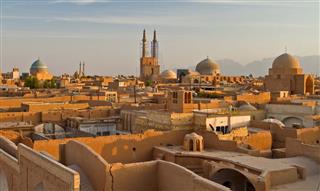 |
The journey to Yazd took slightly under twenty hours in the agents' truck and was dull in the extreme. The mud brick city on the edge of the desert was, according to Jamshid, believed by historians to be one of the oldest on earth (although much of what was visible dated from medieval times). On the way into the city, two Towers of Silence could be seen on their twin hilltops. Jamshid explained that followers of the faith from all around brought the bodies of their dead here for sky burial.
The old city was a maze of tiny streets, whose skyline was dominated by a forest of badgirs (wind catching towers), used to ventilate and cool Yazd’s houses. The city was also dotted with domed structures (qanats), which allowed access to the subterranean water supply whilst protecting it from evaporation. An important trading centre for, amongst other things, carpets and silks, Yazd was also famous for its sweets. The ateshkadeh stood on the edge of the old city, the atash behram fire having been moved here from its previous location within the city in 1932, to a new temple built ready to receive it. The embers originally arrived from Ardakan in 1474 (a site the investigators passed past on their way to Yazd). Jamshid had brought the necessary earthenware firepot with him for carrying the embers back to Isfahan. The ashes generated by the embers during transit would be used for anointing the investigators’ eyelids, but the priest had also brought a small container in which to gather some additional ash, just in case.
Although very tolerant of other faiths, Birapeer the Sikh felt uncomfortable actually participating in the rite of securing the embers, and elected to wait outside with the truck. Settling himself comfortably down to wait, he watched the vehicle and the passers-by in the street in a deceptively idle fashion, his dark eyes missing nothing.
Inside the temple, as Jamshid delivered a letter from his own temple's Elders to those of Yazd, the agents were requested to remove their shoes and socks, and purify themselves by washing their hands and feet. Then they were taken into the inner sanctum, where the Fire of Victory burned. Carefully and reverently, Jamshid collected some of the embers and ash, settling them securely inside the firepot he had brought. Then the group headed back outside.
As they descended the steps towards the outside, several of them got that obscure prickle on the back of the neck that gave the impression of being watched Both Birapeer and Jake caught sight of a young boy, dressed like a ragged beggar, across the street on the edge of the bazaar.
Birapeer flicked a small coin at him, to test his bona fides as a beggar, though his aim was off and instead of bouncing where the child would need to move to get it, it bounced off his forehead - but it worked in that the boy didn't pursue it. Jake pointed directly at him. "Hey, you!" he shouted in Arabic. The boy spun and fled into the bazaar.
 |
Jake sprinted after him, guessed at the boy's likely track through the stalls, took a chance on a shortcut and came face-to-face with the startled spy, grabbing him before he could get away. Instantly, the child began to scream and bawl bloody murder, and a rapidly-increasing crowd of locals, bazari and passers-by gathered around the apparent spectacle of a foreigner mishandling a Persian child.
Birapeer, looking at the scale of the reaction, reckoned there would probably be a need to leave rapidly - or as rapidly as the truck could manage - and scrambled into the driving seat, starting the engine.
Looking around him, Jake realized that he was in a potentially sticky situation. "The little blighter stole from me!" he protested. A couple of the more alert bazari glanced from him to the boy and up to the steps, clearly aware of the improbability of the boy having stolen from the khaarejee (foreigner) while he was on the steps fifty yards away. "He stole before, I just recognized him," protested Jake, feeling his story start to crumble around him. A burly stallkeeper eyed him. "Stole what?" he asked. Jake improvised quickly. "Some papers - my driving license," he said, then grabbed the boy and started roughly searching him, planning to plant said document - but with number of dark glittering eyes on him there was no chance of achieving it.
Further up the steps, Joe had his Thompson out from under his coat and slung ready to sieze if needed. He pulled his own license from his pocket and held it up. "Is this what you're looking for?" he called innocently, waving it towards Jake. Jake siezed the opening like a drowning man grabbing a lifebelt; "Yes! Oh, dear my mistake," he gushed, apologizing in all directions and scattering twenty-toman notes left and right. As the boy, now released, vanished into the bazaar, the locals brushed down their dignity and accepted his apology, allowing him to reach the truck. Cyril let the clutch in smartly and the vehicle rumbled away.
Five hot, dull hours later, the truck was rattling down a gulley between two rocky banks when Cyril, who was driving, looked ahead and squinted. Through the heat-haze he thought he saw something in the road. A few moments later, he realized what it was - the trunk of a Persian Ironwood tree across the whole road - and was slowing to a halt.
He'd not quite stopped when Anné, sitting at the back looking out through the open rear, noticed the first lurking shape moving at the top of the ridge. Whipping up l'Etranger and clicking off the safety catch, she snapped a bullet at the moving head and saw a spray of blood as it disappeared back behind the rocks. The other agents were just turning to see what had happened when the first returning shots began to ring out.
The ambush location was well chosen. Bullets tore through the truck from both sides, punching a planetarium-like array of holes in the canvas roofing and crashing through the cab and engine compartment. A dull, flat explosion from outside heralded the bursting of at least one tyre, and a nasty rattling added itself to the engine note.
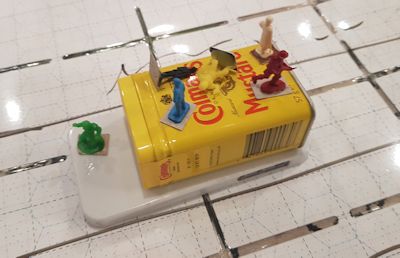 |
Inside the canvas-roofed truck, Birapeer threw himself against the bulkhead separating the cab from the rumble, and paused to see what would happen. Marcus, his pistol in his hand, pulled his Mi-Go light globe out of his suitcase and flung it out the back, where it bounced sparking down the road, as a decoy.
Everyone lurched as Cyril stamped on the clutch and the brake at the same time, then winced as he began to mangle the gearbox trying to throw it into reverse. Despite the invention of SynchroMesh in the '20s, this truck was a long way from having it, and the noises were tooth-grinding as he wrestled with the shift.
Jake threw himself flat into the bed of the truck for what limited cover the metal lower part could offer, as Joe pulled his tin helmet out of one of his bags and grabbed his Bren. As Anné ducked back, working the bolt to chamber another round, she noticed the signs from above that their foes were doing the same thing. Then Joe got his Bren cocked and, without really aiming beyond leaning out of the back and pointing it the way the attack had come, unleashed a devastating arc of suppresion fire. Inside the confined truck the hammering of the .303 weapon in autofire mode was terrifying and deafening; for the unidentified attackers, it was an unbelievable level of response to what they had clearly believed was a civilian vehicle.
A moment later, the same experience became available to the attackers on the other side as Birapeer slashed a hole in the canvas with his kirpan and swept a similar arc of fire across the rocks on the other side. Sparks, dust and splinters of rock flew as the bullets marched across. Two of their foe were incautious in their concealment and were visible when the Sikh opened up; their ripped corpses dropped to drape over the rocks a few seconds later. Lying flat on his back directly under where Birapeer stood, Jake applauded enthusiastically, though neither of them could hear it.
Marcus flicked his fingers through the Voorish Sign and gazed around, but other than the flashes of energy from his companions' occult equipment he saw nothing sinister or magical afoot. Beside him, Anné leaned out and aimed, a flat crack announcing the demise of another bandit.
In the cab, Cyril had managed to engage reverse, and gunned the engine as he glanced at the mirror by instinct, then blinked as he realized it was gone. Lifting the clutch, he began to reverse as fast as he could go back down the gulley; but the flat tyre betrayed him and the truck veered off the road and jammed on the rocky ground to the side. Giving up on getting away, he reached for his rifle, then paused as he registered the absence of more attacking fire.
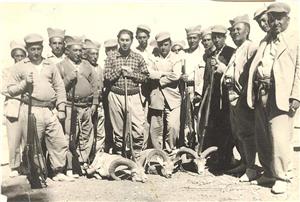 |
Birapeer and Joe both saw why - their attackers, clearly realizing that there was no point fighting such a hopeless battle, had started to scramble down from the rocks and flee. Both men hurried them on their way with more withering automatic fire, bringing down several, then leaped from the truck and scrambled up the rocks to the former ambush point, accompanied by Anné. While Joe and Birapeer continued to massacre the fleeing bandits, Anné moved along the ridge looking at the corpses. To her surprise, the one she'd first shot, despite a horrific head wound, was still alive. Pulling out her medical supplies, she set to work stabilizing him for questioning. Peeling his headwear away, she realized that she held the shredded remnants of a hat similar to the one Joe had seen in Isfahan. These had been Qashq'ai bandits, then.
While the prisoner was lugged down to the road, Joe, Birapeer and Anné made a brief search of their victims. None had much on them, and their clothes were ragged and poor - but each had a worn but serviceable German Mauser Kar98k infantry rifle and two clips of ammunition. There were no ammunition pouches or accessories such as were normally issued with such weapons, suggesting that they had simply been handed a weapon and ten rounds when they were hired.
While Cyril opened the engine covers of the truck and peered worriedly inside, Jake and Marcus made themselves useful trying to jack up the rear end and change the shot-out wheel. However they positioned the jack, though, the surface below it crumbled, even when they stacked rocks under it. Eventually, Birapeer came back and shoved the stock of a German rifle under it did they manage to get the wheel to lift free. A bit embarrassed, the pair managed to redeem themselves slightly by lugging the tree-trunk out of the road instead.
Cyril closed the bonnet, shaking his head. "I think the best thing I can do is nothing," he said grimly. "If I mess with it it may never go again. Whether it gets us home is anybody's guess." With the tyre repaired, he cautiously edged the truck back onto the road, and Jake, Anné and Cyril set to interrogating their prisoner. Jake's linguistic skills didn't really get them far, but then Cyril and Anné - both horribly scarred - loomed into his view, and his resistance broke. What he had to tell them wasn't especially detailed or surprising; the bandits had been hired by someone; he didn't know who, had not seen him, Jamal (their leader) had spoken to him. They were to stop the truck, ideally disable it, prefab wound or kill the occupants but had not hired on for any kind of a battle; the man was very resetful of Jamal for how things had turned out. His words became more and more incoherent as blood flooded into his brain, and a few minutes later he was dead.
He'd not said, but nobody was prepared to bet against Bertrand Lane being the organizer of the attack. It was coming time to pay a visit to the French Archaeologist's dig....
Session Date: 23rd October 2018 |